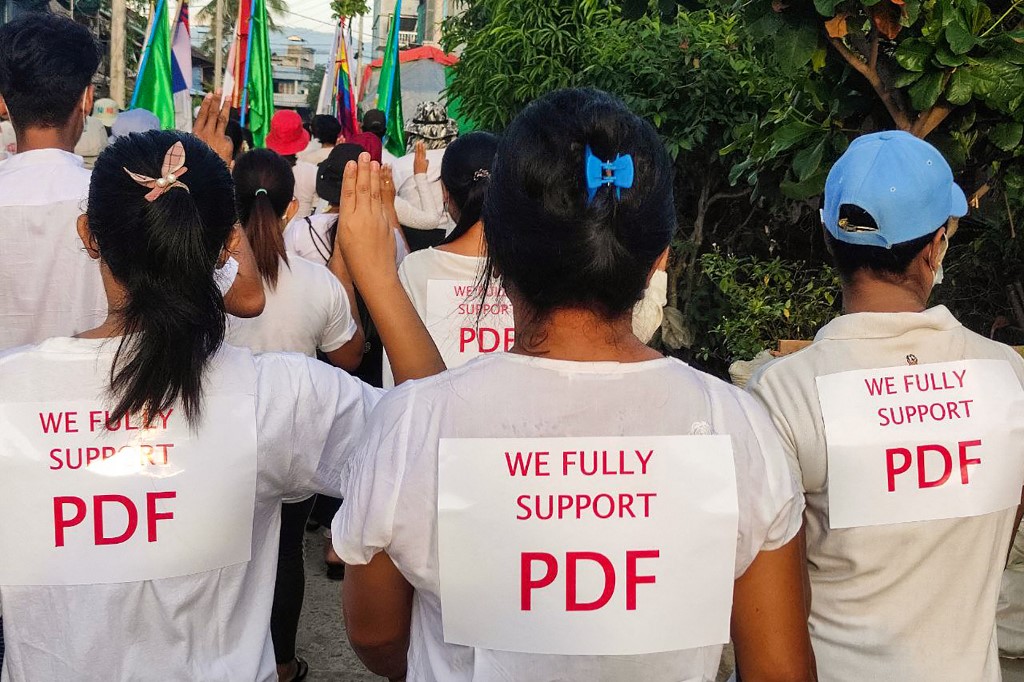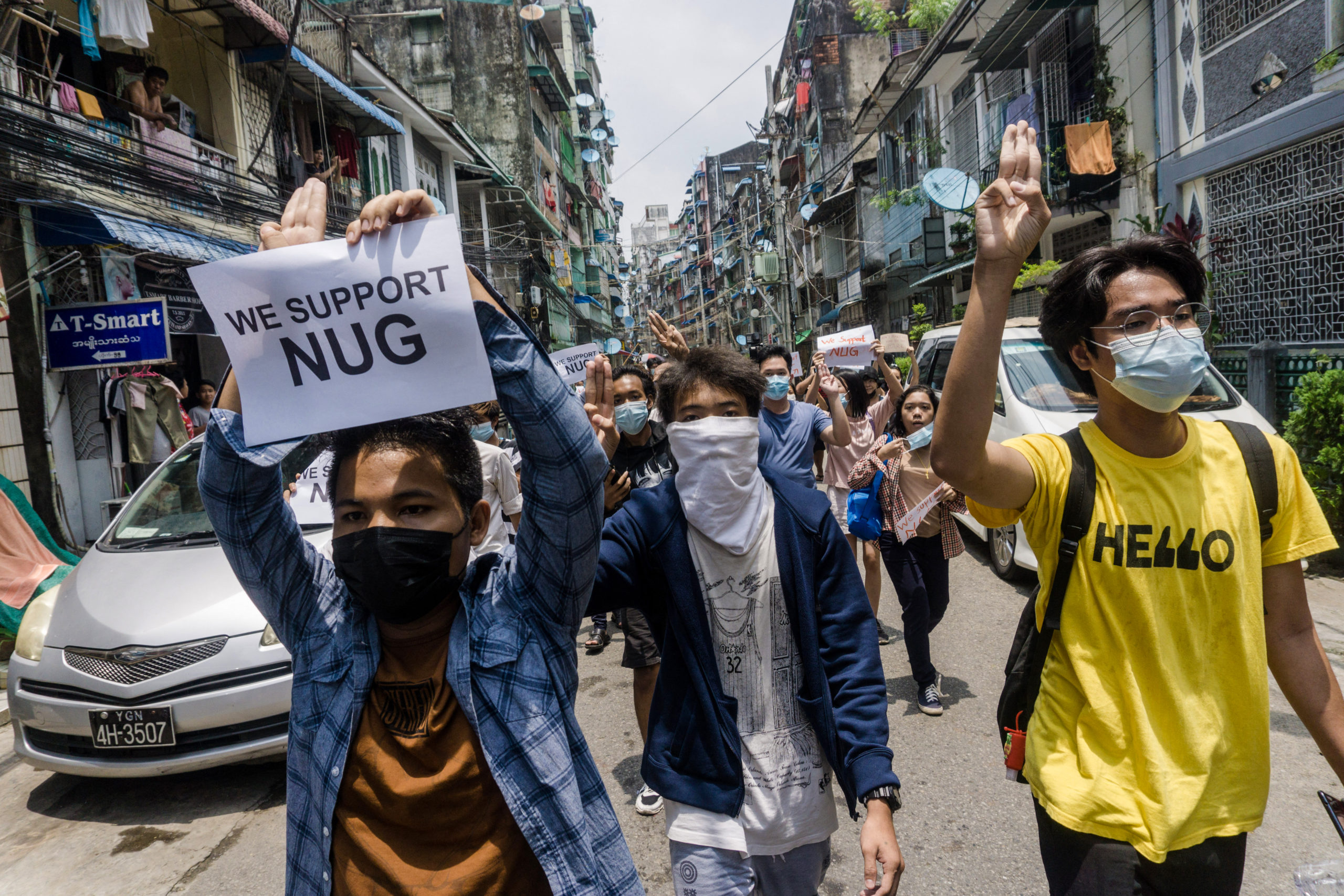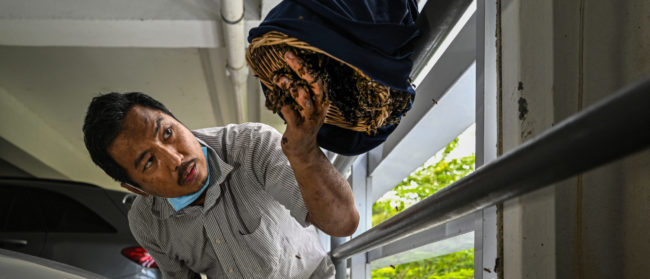Rumours are flying. The camp of Senior General Than Shwe, former leader of the State Law and Order Restoration Council junta that put Myanmar on the path towards a gradual opening to balance increasing dependence on China, is reportedly not at all happy with how Senior General Aung Hlaing has been handling the February 1 military takeover.
Just over three months ago, the military – known as the Tatmadaw – launched a coup against the elected National League for Democracy (NLD) government, citing its refusal to address election fraud. The real reason was that through further liberalising Myanmar’s economy, addressing deep-seated corruption and pushing for constitutional change, the NLD government undermined the crony-capitalist model that has sustained the military leadership for generations.
The junta is now in trouble, not only economically but also politically and militarily, where it is losing to the opposition National Unity Government (NUG) – led by the NLD and its ethnic minority allies. The Tatmadaw, now universally perceived by the public as deeply violent and illegitimate, can barely hold its troops together, and the junta may soon try to save its skin by offering negotiations on a solution to the crisis.
This may please ASEAN and international partners but would undermine the cohesion of the opposition NUG. International partners need to be wary and support the unity government to defeat the Tatmadaw.
“The NUG needs to be given the space, time and international support to see this through,” Janelle Saffin, an Australian MP familiar with the NUG, told me. “The NUG have the capacity and the mandate to bring about a transformation, not just another transition.”
The military’s old ways have brought the country to the brink of collapse. The Tatmadaw as it is now must go, as the only way to achieve a federal, democratic Myanmar is to end the military culture of impunity by forcing it under the accountability of civilian rule.

That process of undoing the military-led order has already begun.
The junta lost first the streets to the protesters, then the public administration to the Civil Disobedience Movement. Now, the coup-makers may even be losing their grip on Myanmar’s Armed Forces.
The opposition has united in a National Unity Government (NUG) promising democratic federalism to the country’s ethnic minorities. This nascent government is in alliance with some ethnic armed organisations, including the Kachin Independence Organization (KIO) in the north of Myanmar and the Karen National Union (KNU) in the southeast, both of which are fighting the Tatmadaw ever more aggressively.
Opposition activists turned guerrilla fighters have organised in what they call “Civil” or “People” Defence Forces, and are now attacking or sabotaging military and police installations and convoys across the country. The NUG has rushed to endorse these forces as the nucleus of their federal army.
The narrow yet crucial coalition the junta has been able to form with ethnic political parties is now breaking apart. The Arakan National Party, the dominant party in southwestern Rakhine State, just last week announced the suspension of its collaboration with the junta. This has the potential to open up yet another military front for the Tatmadaw if the Arakan Army, an ethnic armed organisation closely linked with the Arakan National Party (ANP), decides to more aggressively pursue its bid for far-reaching Rakhine autonomy under what it calls “the way of Rakhita”.
With the ANP out, the Mon Unity Party, the other remaining influential ethnic minority ally of the junta and the biggest party in southeastern Mon State, may soon exit as well.
It is no surprise then that deserting Tatmadaw officers have reported low morale in the armed forces and believe mass desertion is only prevented by brutal repression and threats to the lives of soldiers and their families. The Tatmadaw, always a deeply dysfunctional institution, looks to be cracking.
In light of this, they may soon try to change tack and toe a softer line to limit the damage, committing more fully to the five-point plan that ASEAN developed at its April summit on Myanmar. That would include calling a ceasefire, releasing some high-level prisoners, stalling the progress of legal cases against President Win Myint and State Counsellor Aung San Suu Kyi, and offering negotiations on an end to the state of emergency and a return to power-sharing under some form of arrangement like the 2008 constitution.
During a visit expected this week, the ASEAN Chair, Sultan Hassanal Bokiah, and Secretary-General, Dato Lim Jock Hoi, will test the waters for a compromise solution. Could that set up the breakthrough that ASEAN and the international community have been waiting for?
Myanmar’s coup is an uncomfortable event in an increasingly explosive geopolitical situation in Southeast Asia. Japan, China, India, ASEAN and perhaps also the US will all be tempted to diffuse the situation by jumping at any short-term fix that looks to promise an end to the violence now.
On May 4, Teddy Locsin, Jr., foreign secretary of the Philippines, lamented on Twitter the “overreach on the part of the democratic forces” leading to the coup and declared that: “[I] just want the killings to stop and everything back the way it was.”
He’s surely not alone in that sentiment. Leaders in Thailand, a crucial safe haven and conduit of supplies and money for Myanmar’s opposition, are deeply uncomfortable with the ties of anti-junta activists to Thailand’s own democracy movement.
Myanmar’s fellow ASEAN members, as well as China and India, all want the stability that an NLD-military power-sharing deal had brought over the past five years. If a new military leader were to offer an olive branch, the pressure from the international community on the NUG – or senior NLD figures within that government – to deal may be significant.
Myanmar will have a new constitution that is federal and democratic. These terms will likely not be acceptable to the Tatmadaw leadership – but they may be more palatable to the military’s rank and file
Such an agreement, however, would only apply a band aid to an axe wound. Any deal short of a removal of the Tatmadaw from Myanmar politics and full political federalism would alienate ethnic minorities, split the NUG and end the support of ethnic armed organisations.
In a weekend address, NUG Vice President Duwa Lashi La, a Kachin minority politician, said that the ”path for negotiations agreed at the ASEAN summit is not what the people of Myanmar want”.
In the best-case scenario, a deal with a still-politically powerful military would isolate the NLD, making it vulnerable to the next coup if and when the situation looks more favourable for the new military leadership. In the worst-case scenario, ethnic minority political and armed leaders, joined by the more radical elements in NLD and the civil disobedience movement, might decide to continue the fight and an even more messy conflict might result.
The international community needs to be patient. Any change in approach or short-term concessions by the junta are welcome to ease the suffering of Myanmar people that are slipping into poverty, in particular those who have been displaced by conflict. For example, the junta needs to lift its recent bans on imports via the land route from Thailand, a move designed to squeeze ethnic armed organisations but which is putting vulnerable populations at risk, including many internally displaced people who depend on this trade route.
Myanmar’s economy is collapsing and the humanitarian response to the crisis is severely underfunded. ASEAN humanitarian aid needs to be delivered via the land route from Thailand and benefit civilians without discrimination either against territories under control of the NUG and its allies or those held by the junta.
With the consequences of a political military now made clear, it is the role of Japan, Korea, Australia, India and the West to ensure that the terms of any solution remain strict. The Tatmadaw will be reformed and serve the role of a professional army in a democratic country. Its military-economic empire will be broken up and its business holdings will be wound down.
Myanmar will have a new constitution that is federal and democratic. These terms will likely not be acceptable to the Tatmadaw leadership – but they may be more palatable to the military’s rank and file.
If negotiations fail, the international community must allow the NUG and its allies to give the wobbling Tatmadaw, a violent and parasitic institution, a final push.
Philipp Annawitt served as an advisor to Myanmar’s parliament and government from 2015 to 2020.


